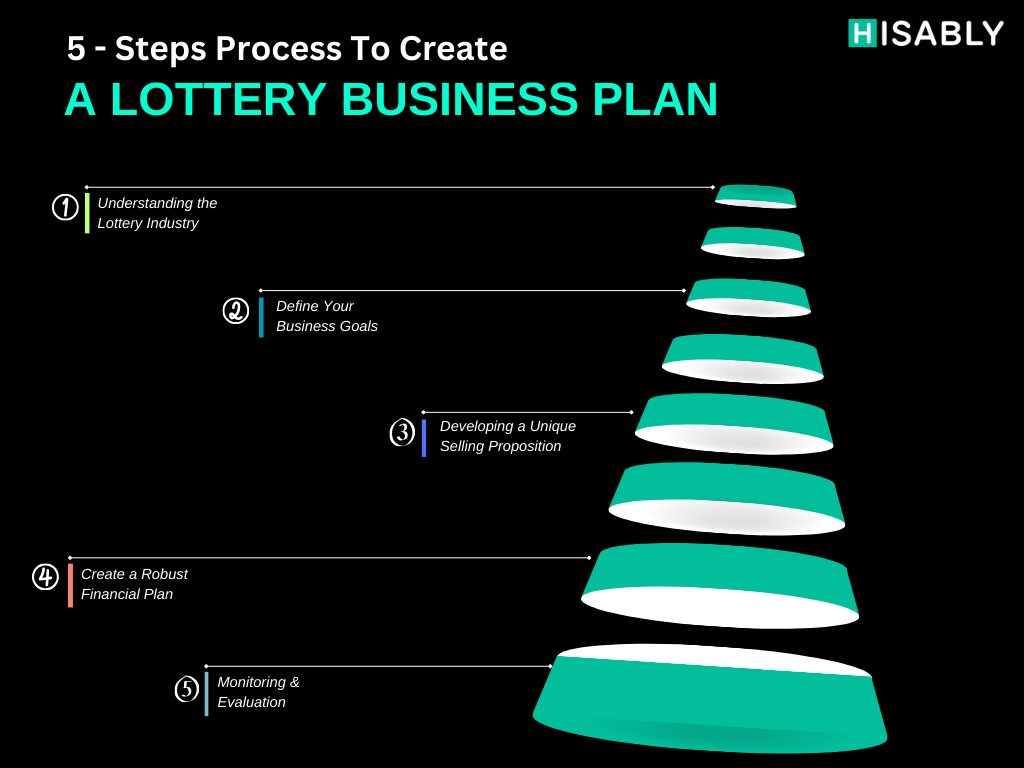Have you ever considered entering the world of lotteries and building a business around it? It is one of the best decisions you have made. Why? Lotteries have fascinated people worldwide due to their ability to deliver life-changing prizes. Moreover, many aspiring US entrepreneurs have benefited from this industry and made lottery businesses successful.
But what is the lottery business, exactly? It is a commercial venture that facilitates the games of chance, enabling participants to purchase tickets or entries to win cash prizes or other gifts. Moreover, the lottery industry is proliferating, and competition is increasing, so it’s essential to have a solid business plan to succeed.
A well-crafted lottery business plan is a complete blueprint comprising the business strategy, funding decisions, and operational framework.
In this blog, we will provide you with all the key insights and guidance needed to build a successful lottery business plan in 2023.
So, are you ready to learn more about creating a winning lottery business plan and how to start a lottery business?
Let’s get started.

5-Step Process to Create a Successful Lottery Business Plan in 2023
Here is the streamlined process you need to follow to create a lottery business plan.
1. Understanding the Lottery Industry
To create a lottery business plan, you need to know the industry in detail. When you know the industry’s history, and what trends are currently running, you can make an effective plan that guarantees success.
In the United States, lotteries are run by the government and are widespread across multiple states. The government sells lotteries to C-stores, gas stations, and other places with the purpose of generating revenue and raising funds for education, infrastructure, and different types of services for the public.
In the United States, the first government-run lottery took place in Puerto Rico in 1934. After a few decades, lotteries became a common source of revenue in New Hampshire in 1964. Governments of various other states in the USA followed the trend and started launching lotteries.
Talking about the current situation, the majority of the states in the US possess a state-run lottery system.
Moreover, the lottery industry in the USA is getting bigger, and offering life-changing prizes to many people. In other words, the industry has evolved a lot and has become the primary source of revenue for governments in the USA.
If you look at the latest statistics, the lottery industry market size is expected to reach $405.30 billion in 2028.
Apart from this, you should know current and future trends to make effective business decisions. When you know about the industry, participants’ preferences, technological updates, etc., you can quickly enter and thrive in the industry.
For instance, if the participants like to make cryptocurrency payments due to transparency, integrate that into your lottery business.
2. Define Your Business Goals
When starting a new lottery business, you should set some realistic goals for your business. These goals should be about different things, but the main point is that they should help your business grow.
Here are certain essential goals that you should consider for making your lottery business successful.
Total Games: First and foremost, you should make a curated list of the games you wish to integrate into your lottery management system.
Increase Sales: You should aim to sell as many lottery tickets as possible and generate good revenue from your store. The more tickets you sell, the more commissions you earn, thus increasing your sales. To increase lottery ticket sales, you need to draw as many customers as possible to your store.
Improve Customer Engagement: You can increase customer engagement by organizing all the lottery tickets in your store or gas station efficiently. Besides this, keeping a friendly staff in your store can provide a better experience for customers and increase engagement.
Promote Lottery Business: You should focus on providing different promotions, such as buy-one-get-one, etc., to encourage customers to purchase more lottery tickets, and generate more sales for your lottery business.
Educate Customers: There would be many customers who aren’t familiar with the lottery and related stuff. Here, you should train your staff members in a way that they answer any queries related to lottery games, chances of winning, and potential prizes.
3. Developing a Unique Selling Proposition
A unique selling proposition in a lottery business would be anything like the features, promotions, or services you provide. The USP includes game formats, life-changing rewards, customized experiences, and more. In simple words, USP should be something that helps you to reach a broader audience and provide a value they don’t find elsewhere.
By offering an established set of features and highlighting them on the website, you offer the most critical reason for users to choose your lottery business over other players in the market. It leads to higher growth and better revenue.
4. Create a Robust Financial Plan
When you have decided to start a lottery business in 2023, building a robust financial plan is crucial. By forming a financial plan, you can ensure that your lottery business survives & thrives in the competitive world.
For starting a lottery business, there are several costs involved. These include licensing costs, equipment purchases, and renovations you want to make in the C-store or gas station. Apart from this, there will be costs of operating the business, such as employee payouts, insurance, rent or lease, maintenance, and more.
The cost further varies depending on how much you want to invest in the lottery business. By assessing these things, you would allocate the funds properly, and avoid financial errors.
The next thing you should consider is listing all your business’s revenue streams. Mainly, the revenue streams would be ticket sales and commissions. Later, estimate the revenue you can generate from them.
Another thing you should do is create a realistic sales forecast for your business. It comprises the market size, customer acquisition, and retention rates. Evaluate the market trends and demographics to determine the overall demand for lottery games in the specific region.
Finally, it is always great to build a financial contingency plan to cope with any emergency situations. Even though you can’t predict any unexpected events, having a backup plan helps you sail through unplanned events. Deciding on specific emergency funds, and getting an insurance plan helps prevent risks.
5. Monitoring & Evaluation
Tracking and evaluation are other crucial things to consider when building a successful lottery business plan.
With each passing day, your business will grow, so you should track it using key performance indicators (KPIs) like ticket sales and revenue.
Another thing you should focus on is obtaining feedback from the customers, and listing all the areas that require improvement.
As you enter into this business and sell lottery, you will have to constantly track lottery tickets, sorting them from where the tickets have arrived and their number. In short, you need to know the total number of tickets you have sold every day. For the same, you will require the help of lottery management tools.
Hisably is the all-in-one accounting software that you need to manage lotteries on your C-store, gas station, and more. This tool will eliminate all the hassle with simple lottery ticket tracking. It lets you track any lottery tickets you sell across your store.
Also, it provides you with daily & monthly sales reports to check the total sales that happened that day and month. The tool even allows you to manage active & inactive lotteries. The tool allows you to look after all of these things by just scanning your lottery tickets.
In short, the software provides daily reports when you scan tickets using the barcode and even helps you verify tickets to prevent fraud. In this manner, the software streamlines the entire process of lottery management.
Wrapping Up
In order to conclude, if you want to venture out into the lottery business, you ought to take the above given crucial factors into consideration that could ease out your execution and streamline your operation. It starts with understanding the lottery industry, defining a USP, building a robust financial plan, and monitoring and evaluating the business whenever needed; you will set yourself on a positive path to a successful lottery business.
After making a lottery business plan, you would require lottery management software to run your business. Here, you can rely on Hisably. It is all-in-one accounting software for your lottery business. With the help of a lottery business plan, and leveraging the lottery management software, you can operate your lottery business efficiently and grow it successfully. Besides this, Hisably even allows you to handle many back-office tasks, such as invoice management, expense management, and more.
Frequently Asked Questions
1. How can I attract investors or funding for my lottery business?
To attract investors or get funding for your lottery business, you need to have a solid lottery business plan. It comprises goals, financial projections, marketing analysis, and strategies. You should know your market well, have a unique selling proposition, and an appropriate business model. You should also create a compelling pitch summarizing the essential business plan( milestones, scalable & profitable business model, USP, return on investment, etc.) and presenting your team’s expertise and experience well.
2. What are the legal and regulatory requirements for starting a lottery business?
For starting a lottery business, you need to comply with the legal and regulatory laws of the particular state. You need to obtain a license to sell lottery tickets and follow laws related to taxation, money laundering, data protection, etc. If you are not familiar with any of the things, the best thing is to reach out to a legal advisor who can guide you through the legal formalities of starting a lottery business.

